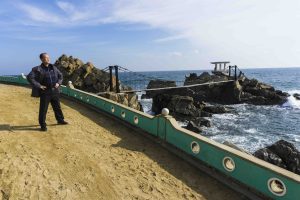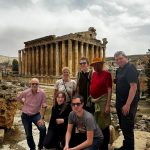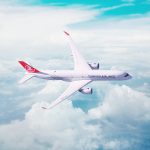An American in North Korea and a North Korean Discuss Film and Culture
Over the next several days, we made our way to Chongjin, the county seat of Hamgyong Province and the third largest city in the DPRK. From there, it was onward to the scenic Chilbo mountains. During that time, I developed a rapport with my guide. Eventually, we were riding together on a bicycle in the Chilbo homestay village and dancing arm-in-arm around a campfire. We also learned from our guides that though the residents of the Chilbo homestay village had previously disliked visits from Americans, their minds had changed after seeing Kim Jong Un on state television with Dennis Rodman.

I have an interest in North Korean cinema and my guides regaled me with stories of cinemas crammed to capacity when Pulgasari, the North’s answer to Godzilla, was released in 1986. We talked of the 1972 film adaptation of the classic revolutionary opera The Flower Girl, and its continued popularity with Chinese audiences. After a few drinks, we giggled like schoolboys while reannacting the sequence from Order No. 27 where a KPA soldier steers a captured US Army jeep with his foot while shooting enemy soldiers with a machine gun. They goaded one waitress at the Outer Chilbo Hotel into performing the theme song from the war-epic Wolmi Island over and over again. I decided to give the waitress a well deserved break and sang a choppy version of the haunting Korean waltz, “I Love Pyongyang.”
“How can an American sing this song!? Ha ha!” exclaimed one amused guide.
No. I had not swallowed the North Korean kool-aid. As with anywhere in the world, if one is respectful and interested in Koreans beyond politics, the Koreans will reciprocate and, from there, meaningful discussions and exchanges can occur.

On my final night in the Northeast, most of the group stayed at the Chilbo homestay village on the East Sea of Korea. At that time, Americans and Japanese were not permitted to stay. This has since been relaxed for Americans, but, alas, only just before the travel ban. After a lively night of drins and toasted marshmallows on the beach, I traveled back to the Outer Chilbo Hotel with our senior guide.
While discussing North Korean films, he tied the underlying themes of the state-produced media to the current political situation and the Korean perspective. “Good culture can lead people, guide people to the future,” he said. “It’s very important. Bad culture can destroy the country. Our films are not so good as past days. The number of new films is not so much. They can produce better films when our country is rich and prosperous. Money, culture and politics is connected closely, I think. Economy increases and culture can rise up.”
He explained that the themes found in Korean art and culture provided insight into the Koreans’ ability to endure hardship. “I like Korean culture because Korean people was very poor and was so far from modern culture in the past because of the feudal state. So feudalist society and socialist society. [America has] many long histories, many years, for 100 years your country has been developed with capitalism. We have not a capitalist society in our country. But people are have been cultured very rapidly with high spirit. It’s very beyond imagination. So many Americans don’t know about it. How Korea stands through the long term sanctions? Long term oppression? Blockade? We have stood and will stand forever because we have very good culture and good spirit. Many people can’t understand it. I’m sure we can do everything.”
Some would argue that Korean culture helps to motivate Koreans overcome hardships brought upon them by their own government. However, I think that author Mike Chinoy in his book best summarized the plight of the North Koreans in “Meltdown: The Inside Story Of The North Korean Nuclear Crisis:” “[The citizens of the DPRK have] paid a terrible price, victims of both their own government and the U.S. effort to undermine it.”
“The big problem is this generation is only for me,” my guide continued, sounding like a grandfather from any country. “They don’t know parents. They don’t know family. They don’t know country. Our country, our people, although we are not so rich, but warm hearted and honest and single hearted unity. We’re happy. Although we have not much money, we have pride. We’re proud of this country.”
My guide cited the recent example of the flooding in the region to back up his point about Korea’s sense of community. “An example, there is a big flood in the area of North Hamgyong province,” he said. “The whole country’s people donate, all people think of this problem, accident, as their family. So they all help with their heart. They’re not obliged, but they do with their hearts. Everybody thinks of himself, right? This is human character, but this is important. So taking more money than the others is character, but how can they stand it? Myself is very important, but the others, if I help you today and tomorrow, I can be helped by the others.”
“Let’s unite and have energy,” he added. “Help each other. Let’s solve the problems, one by one. Why not? We can. We’re all humans. Men. We’re not beasts. So we can understand. We can have a conversation. We can communicate. Let’s solve from smallest one to biggest one, one by one.”
“This is from my mind,” he concluded. “You look very honest, I think, and you look very warm hearted. The other guide said you took so much pictures in our country. So he talked to me, but I don’t care. I said, ‘he can!’ I think you heard many wrong and bad news of country, right? Frankly speaking. But so not only to you but the other Americans. I met so many Americans. We can make friends. We have to understand first and we can change our minds if we make friends. I believe you. I trust you. If I found something bad, some impression from you, but days by days and I met so many Americans and Europeans and in the past I thought like this very great problem to take photos. But now, day by day, I correct my opinion, and, please, I’m not shameful. Why? So maybe the other guide stopped the bus when you come here, right? Let him take more pictures and take more realities of our people and country. Of course, we have many ox carts on the way and many people harvesting with their sickle. I don’t feel shameful with pictures. We’re developing! Our guides, maybe they have something stressful ideas about ‘I can be blamed, I can be punished’ if I do something wrong, but I don’t think so. So no problem. I trust you first. So when I am guide in the bus I first tell everyone I trust you first and I want you to trust me. Trust each other and understand first.”
Right there, with that closing statement, my guide articulated the positive effects of engagement between American tourists and North Koreans. One large complaint by tourists is that they are often limited in what they can see and what they can photograph by guides seeking to ensure that images captured by foreigners show the image of the country that the North Korean government wishes to project. This often leads to distrust and friction between tourists and guides. On his own, this guide realized the negative consequences of limiting what foreigners could see and photograph and took the opposite approach. How can these kinds of revelations occur without engagement? They cannot.






